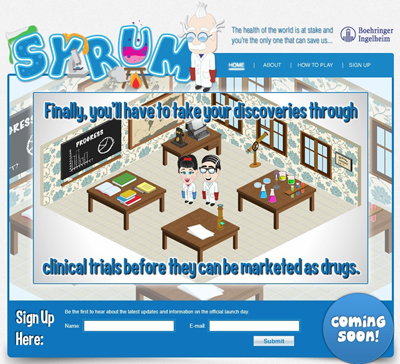Boehringer Ingelheim is hoping to create a new Facebook phenomenon with the development of a pharma civilization game. And while there’s little doubt that the game, called Syrum, has the potential to provide BI with an effective new communications platform for diseases and brands, it could just help address the flagging reputation of the industry as a whole (the game isn’t yet live, but you can get a taste of the graphics here).
“The main objective is to create a kick-ass game, a proper game with a proper development cycle. I wanted to create something unique and different that people will love playing,” said John Pugh, head of online communications, who is spearheading BI’s gaming charge. “It’s about pharma and fun.”
“This is not an oxymoron,” adds Pugh. “You can have the two in the same sentence.”
Back in 2009, Pugh was approached by board members who challenged him to come up with a vision for the future in digital. His response was to assemble a crack team of thought leaders from pharma and other industries and take them to a brainstorming retreat in Reykjavik, Iceland, where they would come up with 12 trends (or “signposts”) to help shape BI’s future developments.
One of these trends was “game-ification” which led Pugh to the idea of creating a “Civilization”-style game borrowing heavily from the proven mechanics of the wildly successful FarmVille and Pokemon games.
Pugh is quick to point out that Syrum is intended to appeal to everyone, not just people employed by pharma, in the same way that “FarmVille is not just for people who work on farms.” FarmVille has around 96 million players and if Syrum can attract a fraction of that it, will give BI a brand new channel.
So how does the game work?
The overall objective is to save the world, one disease at a time, by harvesting molecules (a little like Farmville) and then using them as trading cards to play against diseases (a little like Pokemon). A player must first investigate molecular compounds at a research desk before putting them to the test in the laboratory, then conduct clinical trials and, if successful, advance a treatment to market.
There is, of course, a strong social element to the game—players can invite friends, power up to find new compounds, buy gifts and take on different challenges, such as linking up with “scientists” from, say, five different continents. However, they must remain ethical and independent throughout.
Pugh noted that players will experience how collaboration improves lives, “Which,” he says, “is exactly what we do at BI.”
Syrum is currently in beta testing and Pugh is aiming to have it released by the end of the year. He admitted that he is not exactly sure yet how his brand teams will use the new platform, but that there will be an infinite number of opportunities for intervening with disease information (such as setting challenges in specific therapeutic categories) and possibly even branded messaging.
However, given how closely the game experience replicates the different stages and hurdles associated with researching, developing and marketing new treatments, there is a strong argument to suggest that—if enough people play it—Syrum’s value could extend far beyond that of simply a messaging vehicle for BI. It could actually induce among its players a degree of sympathy with pharma companies for the toughness of getting a drug to market, and could therefore help improve the image of the industry as a whole.
While Pugh said that wasn’t an objective of the game, he does see a value-add. “I’m not saying I’m the savior of the pharma industry,” he said, “but if in some way this helps people to experience and better understand the challenges [facing pharma], that can only be a good thing.”








